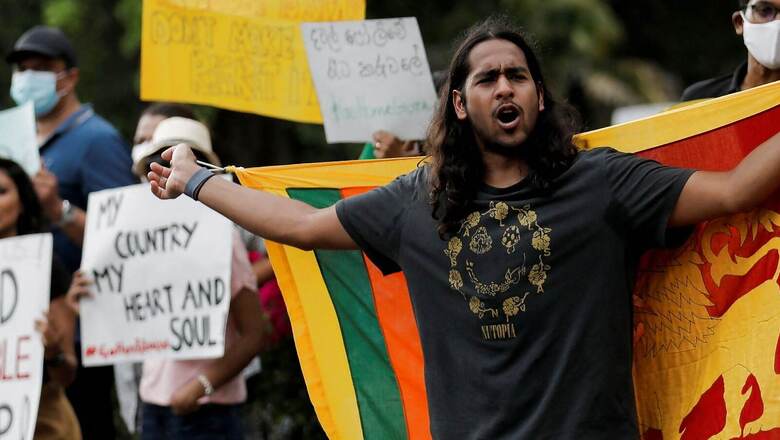
views
In 2019, newly elected Sri Lankan President Gotabaya Rajapaksa unveiled his grand vision for Sri Lanka, “Vistas of Prosperity and Splendour” within which he outlined a 10-year transition to fully organic farming in Sri Lanka. But what was supposed to be a slow and gradual transition turned into a sudden shock when in April 2021, he announced that starting next month, the import of chemical fertilisers and agrochemicals would be completely banned in the country.
Although in public it was claimed that the ban was aimed at controlling healthcare costs due to the ill effects of chemical fertilisers and pesticides, but in reality, it was Sri Lanka’s precarious foreign exchange situation that led Rajapaksa to curb imports.
The ban led to immediate protests by the farmers who complained about the lack of preparation to switch to an organic farming mode at such short notice. Even the general public was angry due to food inflation caused by the non-availability of chemical fertilisers and hence low yields.
Growing protests and concerns about food prices led the government to revoke the ban within seven months of its imposition. However, significant damage had already been done. According to reports, nearly a third of Sri Lanka’s agricultural land remained unused due to the ban with rice production falling by 20%. Sri Lanka had achieved self-sufficiency in rice but still, it was forced to import $450 million of rice as rice prices increased by 50%. The tea industry which is Sri Lanka’s major commodity of export was also hit massively with an economic loss of $425 million further worsening the country’s foreign exchange situation.
Sri Lanka is a small country with not enough arable land leading to a long-standing policy of improving agricultural productivity to achieve food security in the last 60 years. The decision to shift to organic farming all of a sudden sent even the technical apparatus into shock as they lacked the know-how to train farmers in organic farming. Sri Lanka is not the only South Asian country to do this. Bhutan is another country that vowed to go organic in 2008 but as of 2021, only 10% of its crop production and 1% of land can be classified as organic. The country has pushed the target to 2035 now.
Also Read: China Prefers Messed up Economies, but Sri Lanka’s Mess is of Its Own Making
The most important issue with organic farming is its low productivity. On average, yields from organic farming are around 20% lower than conventional farming. Science is looking for a solution by developing tailor-made varieties for organic farming but currently, conventional farming crop varieties when used in organic mode are continuing to suffer from poor yield.
To add to that, the knee-jerk manner in which policy was implemented in Sri Lanka without providing enough time-period for transition is also to be blamed. Going slow, going steady is the mantra to follow as farmers need appropriate training, organic fertilisers need to be available aplenty and the entire sector needs time to adjust to the new mode. The availability of organic fertilisers is also a challenge. According to a few estimates, Sri Lanka’s paddy, tea and rubber production are dependent on chemical inputs in a range of 90-94%. In comparison, the country has the capacity to produce only 2-3 million tonnes of bio fertilisers when the requirement for the same is at least 3 times more.
The Indian connection
Sri Lankan troubles have an interesting Indian connection. It was on the advice of Vandana Shiva, an Indian Environmentalist, that President Gotabaya Rajapaksa took the decision to ban chemical fertilisers in 2021. Shiva is known for her firebrand activism against anti-modern agrarianism fetching her many awards but also tonnes of criticism. It was her organisation Navdanya International that was advising the Sri Lankan government, an achievement she proudly displayed on her blog.
World over, Organic Farming is a hotly contested issue. While the environmentalists and anti-modern farming activists lobby for organic farming citing its benefits for the environment, research exists that proves organic farming is not as eco-friendly as claimed. In fact, evidence suggests that it may destroy the ecosystem even more. Some also say organic farming isn’t as organic as it is made out to be with some organic pesticides being more harmful than synthetic ones. Plus the low yields mean wastage of more water and farmlands leading to the non-availability of land for other species that might go extinct.
Also Read: Voice from Sri Lanka: The Sea of Protesters is Not Going Home Until Rajapaksa Does
Back home in India, inspired by the Sikkim example which has earned the tag of “100% Organic” state, many other states including Kerala are considering going organic. However, despite the accolades that Sikkim receives, the dark reality of its organic story is that it is dependent on nearby West Bengal for its food security. The yields have fallen and farmers are dissatisfied with the government for not banning agricultural products from outside the state which are cheaper in comparison to their ‘organic only’ produce.
The truth remains that organic food on the table is a luxury for our times. In ancient times, the population was low and all farming was organic by default. In the current times, there is a trade-off between food security and 100% organic produce. Though science is still working on how to deliver organic food without compromising its productivity. Till then, sensible policies and not wokeness is the only logical road ahead.
The author is a PhD in International Relations from the Department of International Relations, South Asian University. Her research focuses on political economy of South Asia and regional integration. Views expressed in this article are those of the author and do not represent the stand of this publication.
Read all the Latest Opinion News and Breaking News here




















Comments
0 comment